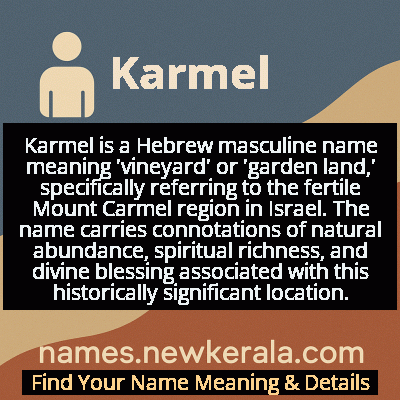Karmel Name Meaning & Details
Origin, Popularity, Numerology Analysis & Name Meaning of Karmel
Discover the origin, meaning, and cultural significance of the name KARMEL. Delve into its historical roots and explore the lasting impact it has had on communities and traditions.
Name
Karmel
Gender
Male
Origin
Hebrew
Lucky Number
6
Meaning of the Name - Karmel
Karmel is a Hebrew masculine name meaning 'vineyard' or 'garden land,' specifically referring to the fertile Mount Carmel region in Israel. The name carries connotations of natural abundance, spiritual richness, and divine blessing associated with this historically significant location.
Karmel - Complete Numerology Analysis
Your Numerology Number
Based on Pythagorean Numerology System
Ruling Planet
Venus
Positive Nature
Harmonious, responsible, caring, and artistic.
Negative Traits
Overly idealistic, superficial, possessive, or jealous.
Lucky Colours
Pink, turquoise.
Lucky Days
Friday.
Lucky Stones
Diamond, turquoise.
Harmony Numbers
2, 3, 9.
Best Suited Professions
Artists, musicians, teachers, healthcare workers.
What People Like About You
Warmth, nurturing nature, artistic flair.
Famous People Named Karmel
Karmel Myers
Israeli musician
Renowned composer and performer of modern Hebrew music
Karmel Shavit
Israeli journalist
Prominent media personality and news anchor in Israeli television
Karmel Melamed
Journalist and writer
Noted Iranian-American journalist covering Middle Eastern affairs
Karmel Sarkisian
Religious leader
Influential Armenian priest and community leader
Name Variations & International Equivalents
Click on blue names to explore their detailed meanings. Gray names with will be available soon.
Cultural & Historical Significance
The cultural importance extends beyond religious contexts into national identity, as the Carmel region remains an important geographical and cultural landmark in modern Israel. The name connects bearers to centuries of Jewish history and the land of Israel itself, embodying both natural beauty and spiritual heritage. This dual significance makes Karmel a name that carries weight in both religious and secular Jewish contexts, representing continuity with ancestral traditions while maintaining relevance in contemporary society.
Extended Personality Analysis
Individuals named Karmel are often perceived as nurturing and grounded, with a strong connection to nature and growth-oriented pursuits. They tend to exhibit patience and dedication similar to a vineyard keeper tending to grapes, showing care in relationships and projects alike. These individuals typically possess a calm, steady demeanor with an underlying strength that emerges when needed, much like the resilient mountain from which their name derives. Their personality often blends practicality with spirituality, making them both dependable in daily matters and insightful in deeper conversations.
Karmels are frequently seen as peacemakers who cultivate harmony in their environments, using wisdom and gentle persuasion rather than force to resolve conflicts. They embody the qualities of growth, nourishment, and steadfastness that their name's vineyard symbolism suggests. While generally calm and reflective, they can demonstrate remarkable resilience when facing challenges, much like the enduring Mount Carmel that has withstood centuries of historical changes. Their approach to life tends to be methodical and purposeful, with an appreciation for natural rhythms and the value of gradual, meaningful development in all aspects of life.
Modern Usage & Popularity
In contemporary times, Karmel remains primarily used within Jewish and Israeli communities, though it has gained some international recognition through cultural exchange. The name maintains moderate popularity in Israel, particularly among families with strong connections to Hebrew traditions or those living near the Carmel region. While not among the most common names, it carries a distinctive quality that appeals to parents seeking meaningful biblical names with natural imagery. In recent years, there has been a slight increase in usage among diaspora Jewish communities and individuals interested in Hebrew names with deep cultural roots. The spelling 'Karmel' is less common than 'Carmel' internationally, but both forms preserve the name's essential meaning and heritage. Modern usage reflects a balance between traditional significance and contemporary appeal, making it a choice that honors history while remaining accessible in today's globalized world.
Symbolic & Spiritual Meanings
Symbolically, Karmel represents fertility, abundance, and spiritual nourishment, drawing from its vineyard origins and mountain symbolism. The name evokes images of growth, cultivation, and the patient development of something valuable over time, much like tending grapes until they produce fine wine. It also carries connotations of divine blessing and protection, as Mount Carmel was historically seen as a sacred place where heaven and earth met. The vineyard imagery suggests not just physical productivity but also the cultivation of character, relationships, and spiritual life. Additionally, the mountain aspect symbolizes stability, endurance, and a higher perspective, combining earthly groundedness with spiritual aspiration in a powerful metaphorical blend that speaks to both practical achievement and transcendent values.

